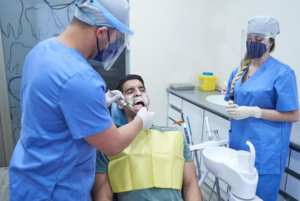
If you are looking for a challenging yet rewarding career path that is dedicated to the betterment of society, then consider pursuing public health as an option. With a degree in public health, graduates can join a broad range of careers from medicine and policy to nutrition and education — all fields dedicated to improving the lives of individuals and populations alike.
By understanding how various systems contribute to public health, professionals have the opportunity to make real-world improvements in the communities they serve.
In this article, we’ll discuss some specific career options for those who hold a degree or certificate in public health. Read on to learn more about contributing your skills as part of today’s healthcare teams.
Epidemiologist
Epidemiologists are public health professionals who study the patterns and causes of diseases, injuries, and other health conditions in populations. They use their findings to develop strategies for preventing and controlling outbreaks and identifying risk factors for specific diseases.
In this field, you can work in various settings, including hospitals, government agencies, and research institutions. Epidemiologists play a crucial role in public health as they work to prevent the spread of diseases and improve overall community health.
To pursue your career in epidemiology, you may need to earn a post baccalaureate certificate in public health. This additional education will provide you with the necessary skills and knowledge to conduct research, analyze data, and develop interventions that can lead to improved health outcomes. Most of the reputed universities offer an online classes option. You can continue working while studying, which is more convenient for many individuals.
Hospital Administrator
Public health graduates can make excellent hospital administrators. With their knowledge of health systems and policies, they are well-equipped to manage the day-to-day operations of a healthcare facility. They can also work with other healthcare professionals to ensure that the facility is providing high-quality care to patients.
Moreover, hospital administrators also have the opportunity to implement health initiatives within their facilities. This could include promoting healthy lifestyles among staff and patients, developing programs for disease prevention and control, and creating policies that promote patient safety.
Biostatistician
Biostatisticians are vital members of public health teams, as they use their mathematical and statistical skills to interpret data related to public health issues. They work closely with epidemiologists and other healthcare professionals to design studies, collect data, and draw conclusions that can inform policies and interventions.
With a strong background in health, biostatisticians have the expertise to understand complex health data and communicate their findings effectively. They may work in a variety of settings, such as government agencies, research institutions, or pharmaceutical companies.
Health Educator
A health educator is responsible for promoting good health practices and disease prevention to individuals and communities. This includes creating educational materials, organizing and leading workshops or events, and working with community leaders to develop effective health programs.
Public health graduates possess the knowledge and skills needed to translate complex medical information into easy-to-understand language for the general public. They also have a strong understanding of cultural sensitivity and can effectively communicate with diverse populations.
Moreover, with the rise of social media and technology, health educators can utilize these platforms to reach a wider audience and promote healthy behaviors. This career option allows public health graduates to make a direct impact on individuals’ lives by equipping them with knowledge and resources to improve their overall health.
Social and Community Service Manager
Public health graduates are well-suited for a career as a social and community service manager. These professionals work to create programs and services that meet the needs of their communities, whether it be in healthcare, education, or social services. With a background in public health, graduates have a deep understanding of the populations they serve and are equipped with skills such as data analysis, program evaluation, and communication that are essential in this role.
They can use their knowledge to develop and implement effective strategies to improve the health and well-being of individuals in their community.
Clinical Trials Scientist
Clinical trial scientists play a vital role in the development of new medicines and treatments for diseases. They are responsible for designing, managing, and analyzing clinical trials to ensure that new drugs or interventions are safe and effective for human use. With a background in public health, graduates have the knowledge and skills necessary to understand how social, behavioral, environmental, and biological factors impact health outcomes. This knowledge is essential for designing clinical trials that can accurately test the efficacy of new treatments and medications.
Moreover, clinical trial scientists also collaborate with healthcare professionals to identify and recruit participants for the trials, as well as collect and analyze data throughout the trial process. This role requires attention to detail, strong analytical skills, and a thorough understanding of research methodologies — all qualities that are nurtured in health programs.
Public Health Nurse
If you wish to work as a front-line healthcare provider while still being able to contribute towards public health, pursuing a career in public health nursing is an excellent choice. As a public health nurse, you will have the opportunity to work with various communities and populations, providing care and education on disease prevention and management.
Additionally, you can also engage in advocacy efforts for promoting healthy lifestyles and improving healthcare policies at the local, national, or global level. Plus, with the growing shortage of primary care physicians, public health nurses play a crucial role in bridging the gap and ensuring that underserved populations have access to quality healthcare.
Survey Statistician
Survey statisticians are responsible for designing and analyzing surveys to gather data on various health-related topics. They use their statistical knowledge to ensure that the survey questions are unbiased and effective in measuring the desired outcomes. With a background in public health, graduates have the expertise to understand complex survey data and draw meaningful conclusions from it.
Moreover, as survey statisticians often work for government agencies or research institutions, they have the opportunity to contribute to shaping public health agendas and initiatives. This career option allows individuals to combine their passion for statistics with a desire to make a positive impact on society’s health.
Conclusion
A degree in public health offers a vast array of possibilities. With your creativity and passion for making the world a better place, it’s up to you to decide where you’d like to put your newfound skills to work.
Whether your goal is to become an epidemiologist, biostatistician, or community health worker, or something else entirely, a degree in public health will provide you with the theoretical and practical wisdom necessary to go forth and thrive.
So, don’t be afraid to take your career into your own hands. Explore new paths, create job opportunities, challenge yourself, and make an impact on the world.






